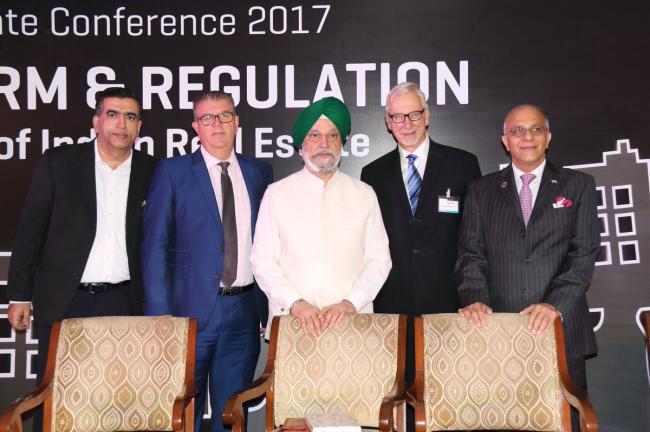
Housing sector shortage close to 10 million units, to be addressed through PMAY says Minister
New Delhi, Nov 15 (IBNS): Hardeep Singh Puri, the Centre's Minister of State (I/C), Housing and Urban Affairs, while addressing the participants at the RICS Real Estate Conference on Wednesday, said that the Real Estate Act will have a long-term transformative effect,.
The Conference is titled 'Policy, Reform and Regulation: The backbone of Indian Real Estate'.
While the real estate sector has grown significantly in recent years, it has largely been unregulated, with absence of professionalism and standardization, and lack of adequate consumer protection.
It has also largely been opaque, with consumers often unable to procure complete information, or enforce accountability against builders and developers in the absence of effective regulation.
The biggest fallout affecting the sector is delay in project completion; diversion of funds collected from buyers; one-sided contracts in the absence of adequate supply; reneging on contractual commitments by both the developers and the buyers; and constraints in financing and investment options available to the sector, thereby affecting its long-term growth.
Beginning May 1, 2017, the Real Estate (Regulation and Development) Act, 2016 (RERA) has come into effect and covers all the residential and commercial projects in every state.
The Act is aimed at consumer protection, by creating an online system for information sharing so that there is mutual trust between the developer and the buyers, and projects are implemented in time.
The minister said, “We have put in place an eco-system to ensure that real estate sector is properly governed and buyers are empowered. I have absolutely no doubt that the history of Real Estate in India will be written in two segments, pre and post RERA."
"The pre-RERA phase was characterised by the dreams and ambitions to own a house of many being dashed for a considerable period of time by a few persons exploiting that dream. We are not out of that phase yet,” he said.
The minister observed that the lack of finances was only part of a problem for owning a house.
He said that there was very little transparency in the housing sector.
"Broken promises, incomplete housing projects tell a tragic tale of untold misery inflicted on hapless citizens who, in many instances, had pledged their life time savings and even the family silver just to own a house. We are still witnessing the final phase of a cleaning up process involving the misdemeanours of a few who tarnished the image of the many developers who were genuine in their dealings," he said.
Referring to a technical study conducted in 2011, which placed the housing shortage at 18.76 million in urban areas, of which 96 per cent is in the EWS segment and in LIG Housing, the Minister said that subsequent assessments led to a revision of this figure and in the final analysis, the shortage is likely to be around or in excess of 10 million units, which is aimed to be addressed through the Central government's flagship programme ‘Pradhan MantriAwasYojana (PMAY) Urban'.
Minister Puri stated that the thrust of the Mission has been to make available housing for the Economically Weaker Sections (EWS), Lower Income Groups (LIG) and also the MIG (Middle Income Group), by harnessing government land.
“We have also released various PPP models to encourage housing through private partnership. Among the distinctive features of this scheme are that government will make available the land and in addition provide a subsidy to each allottee and assist in obtaining easy financing from banks for the remaining sum required. The house will be in the name of the lady individually or co-jointly with the male member of the family. This will help gender empowerment. It will have a kitchen and a toilet and serve to help foster security of the girl child,” he explained.
Stressing the importance of the Housing sector, the Minister said that it plays a catalytic role in fulfilling the demand for housing and infrastructure in the country and is the second largest sector after agriculture providing employment to 6.86 per cent of the workforce in the country.
Referring to RERA, the Minister said that the Act itself is a response to the dire need of Indian consumers and in discharge of the sovereign functions towards public interest.
Image: HardeepSPuri/Twitter
Support Our Journalism
We cannot do without you.. your contribution supports unbiased journalism
IBNS is not driven by any ism- not wokeism, not racism, not skewed secularism, not hyper right-wing or left liberal ideals, nor by any hardline religious beliefs or hyper nationalism. We want to serve you good old objective news, as they are. We do not judge or preach. We let people decide for themselves. We only try to present factual and well-sourced news.







